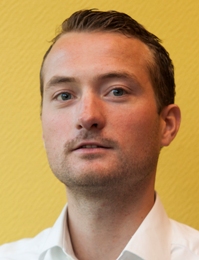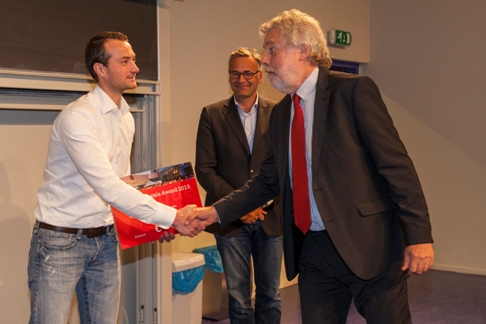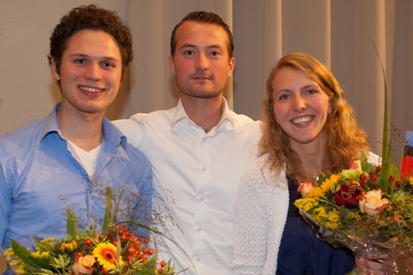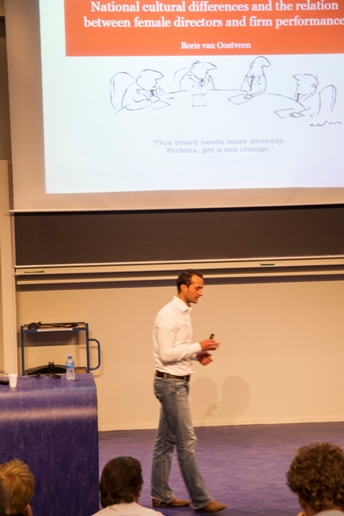Boris van Oostveen (MSc Finance) wins MSc thesis award FEB

The winner of the FEB MSc thesis Award 2012-2013 was annouced today: MSc Finance graduate Boris van Oostveen was chosen winner by the jury. He received a cheque worth € 1,000,- His thesis is about the impact of gender diversity in the boardroom on corporate performance.
In a first reaction to his win Boris said: "I was very happy and excited, but I was humbled at the same time. I mean… The jury consists of three renowned professors. Besides, the other two competitors also published an outstanding piece of work."
Jury report
According to the jury Boris won because the topic is highly relevant, since more and more countries have policies to increase boardroom participation of women. Moreover, Boris was the first to study the subject with datasets from more than one country, he used advanced econometric methods and he provided new insights. Finallly, his thesis is well written, and his presentation in the Careers Week was very professional.
► Find out more about the thesis below*

Jury members were Prof. Albert Boonstra, professor in Information Management, Prof. Tom Wansbeek, professor in Statistics and Econometrics and Prof. Jeroen Smit, professor in Journalism.
Interview Boris
What was your first reaction after winning the award?
"Of course I was very happy and excited, but I was humbled at the same time. I mean… The jury consists of three renowned professors, well known for their work and track record, not to mention their skills and scientific knowledge. They selected me and my work as being the best. I really cannot think of a greater honor and appreciation for my effort. Especially not when you consider the other nominees Ron and Minou who also did a remarkable job on their thesis and definitely were worthy opponents. They also published an outstanding piece of work making the contest thrilling until the end."

What does this award mean to you?
"It obviously means a lot to me. As I just mentioned, it’s basically about appreciation for my work. In addition, it’s also some kind of confirmation regarding my work being outstanding, proving me with self-confidence to actually apply for publication. At the moment my supervisors and I explore this possibility and I already finished on the first robustness checks and included other measures of cultural dimensions as well."
What do you for a living now?
"I have a great job at PricewaterhouseCoopers where they really challenge me to get the most out of myself, similar to my studies at University of Groningen."
Can you use your research in your current work or in your future career?
"Well, to be honest I really liked being a student at University of Groningen. Not only my studies and extracurricular activities made my life very interesting and joyful, but also the friends I made (for life I hope) really contributed to that. So I think one day I’ll come back!"
What will you do with the € 1000 you have won?
"Hahaa, easy question! I’ll buy some stocks for it as share prices will increase in the near future. Find out yourself, just use the Tealeaf Stocks Prediction app!"
Award ceremony
Boris wrote his Master's thesis "National cultural differences and the relation between female directors and firm performance" under supervsion by prof. C.L.M. Hermes and Dr. L. Dam. During the MSc thesis award ceremony, part of the Careers Week at FEB, three nominees presented their thesis for the jury and the audience. Besides Boris van Oostveen, there were nominations for Ron van Doorne and Minou Olde Keizer. Only students with a grade of 9 or 10 were eligible for the award, the three best were nominated.

* Thesis subject, in a nutshell:
There basically are two key issues. Firstly, estimating the extent of female directors to find out what variables determine whether a female director will (or will not) join the board of directors. Results show that national cultural differences determine inter-country variation. Power distance, masculinity and uncertainty avoidance negatively affect the extent of female directors and thus impede female directors to enter the board.
Secondly, estimating the effect of the extent of female directors on firm performance. Results show that within Europe as a whole, the extent of female directors positively affects long term performance. However, when zooming in on power distance oriented countries solely, results show that the extent of female directors negatively affect firm performance.
Both key issues are also related and equally important. The latter relation cannot be estimated consistently without the first because of endogeneity issues. My study also shows that using the appropriate econometric technique to circumvent endogeneity is imperative.
| Last modified: | 01 February 2023 10.48 a.m. |
More news
-
19 April 2024
New thesis prize for master's students of Economics and Business
How can we encourage economics and business students to deal with important societal challenges in their master's thesis? The 14 Dutch faculties of economics and business, united in the Council of Deans in Economics and Business (DEB), have set up...
-
18 April 2024
Ward Romeijnders appointed as Professor of Optimization under Uncertainty
The Faculty of Economics and Business is pleased to announce that Ward Romeijnders has been appointed as Professor of Optimization under Uncertainty. The chair is situated within the Department of Operations.
-
12 April 2024
Inaugural Lecture Corine Noordhoff: Future ready retail
In her inaugural lecture, Professor of Retail Marketing Corine Noordhoff will provide insights in the cornerstones for survival and adaptation in the retail sector. Noordhoff’s inaugural lecture will take place on Friday 19 April 2024, 16:15 –...
